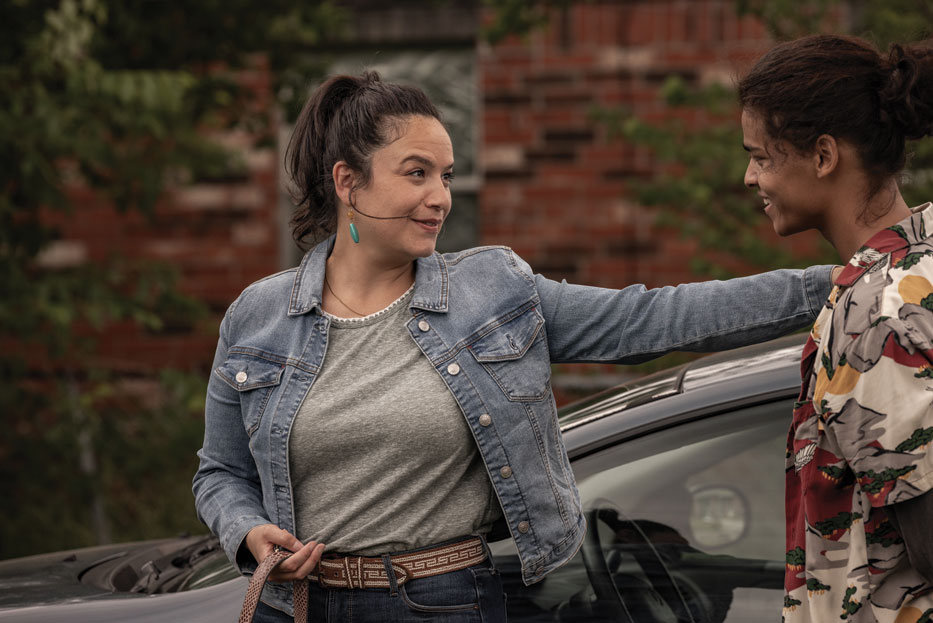 Actress Sarah Podemski as Rita in “Reservation Dogs” (Courtesy of Sarah Podemski)
Actress Sarah Podemski as Rita in “Reservation Dogs” (Courtesy of Sarah Podemski) Actress Sarah Podemski sees much kinship between indigenous communities and the Jewish people, particularly when it comes to humor. She would know, after all: she was born in Canada to an Anishinaabe (Ojibwe) mother, and raised by an Israeli-Jewish father.
These days, she’s a recurring character on the hit Hulu series, “Reservation Dogs.” The show centers around the experiences of indigenous teenagers in Oklahoma struggling to get by. It’s equal parts comedy and tragedy, with characters that can hardly get through more than a few lines of dialogue without ribbing each other. Podemski plays Rita, the mother of one of the main characters, a troubled teenager named Bear.
Podemski, along with her sisters, Tamara and Jennifer (both actresses as well), grew up doing Shabbat dinners with their father and participating in powwows with their mother. They enjoyed challah bread on Friday nights, and ate frybread at the summer powwows.
But looking back, she reflected on the horrors endured by her grandparents from both sides of her family — both stemming from government-sponsored religious and cultural persecution.
Her grandfather, originally from Poland, survived six concentration camps during the Holocaust.
“He took that trauma and was able to turn it into a celebration of life. I find that that’s very similar in the native community.”
– Sarah Podemski
“Despite everything my grandfather went through with the Holocaust, he was always incredibly positive and had a great sense of humor, showed up with a smile and was always laughing and full of joy,” Podemski told the Journal. “He took that trauma and was able to turn it into a celebration of life. I find that that’s very similar in the native community.”
Unfortunately for Podemski’s mother’s parents, their cultural identity was systematically stripped from them in what was known in Canada as residential schools.
In the U.S. they were called Indian boarding schools, and both of her grandparents were sent to one in Saskatchewan. The chuch ran the “schools,” and they forcefully took indigenous children out of their homes to beat the culture out of them, eliminate their family ties and “assimilate them into society” according to Podemski.
The actress said she remembered her Jewish grandfather pondering why it has been so difficult for indigenous people to thrive in Canada.
“He had this experience of coming to Canada and thriving after the Holocaust,” she said. “My grandfather was still allowed to speak Yiddish and Hebrew. They weren’t allowed to but they found ways in the concentration camps to celebrate the holidays and keep their culture, which is what kept a lot of people alive—that hope and that spirit, the spirituality and the tradition.”
For native children, though, that was all taken away from them.
Still, it is the humor and positivity in both the Jewish and native communities that make all the difference.
“If we aren’t going to laugh about this or turn this into a positive, the sadness will eat you alive,” Podemski said. “I think there’s something very similar to how we approach our lives from my Jewish background and my Native background.”
Podemski said that in the native community, there is a surplus of humor and laughter. And now on “Reservation Dogs,” many more people get to see just how native comedy manifests itself.
“Jews have been able to be funny for so long, [and] we know Jews are funny,” Podemski said. “It’s this space where we have always been involved in comedy, and it’s very recognized. I think that it’s a really exciting time that we’re seeing native humor and these incredible native comedians that are coming out and writing these jokes and getting to find some space on TV. That’s the big parallel in terms of [the] approach to life and coping with that intergenerational trauma.”
The last of the residential schools closed as recently as 1997, and the effects are still felt by indigenous people. Podemski said that there have been many times when she and her sisters auditioned for indigenous character roles, only to have been rejected in favor of a white, non-indigenous actress.
But now, with “Reservation Dogs,” which was just greenlit for a second season, Podemski sees an unprecedented opportunity to have her people’s voices heard. She’s optimistic that viewers will learn about the native plight and empathize with the struggles to exist and keep traditions alive.
Just last week, she said she was sitting in a sukkah with a relative and reflecting on the power of the arts, food and song to keep their cultures alive.
“When [I] go to [a] powwow and [I] hear the drum, I automatically have this physical experience where I start to cry,” she said. “Music is such an incredible connection to our culture and I get emotional too when I hear a rabbi sing. There’s this power in the way we hear music. It’s a really moving experience to be so close to that music and tradition. You know that there’s so much history in those songs. And I feel similar [to] the times that I’ve gone to certain ceremonies in the Jewish community and we sing our songs. There’s so much tradition in it, and it’s so comforting.”























 More news and opinions than at a Shabbat dinner, right in your inbox.
More news and opinions than at a Shabbat dinner, right in your inbox.